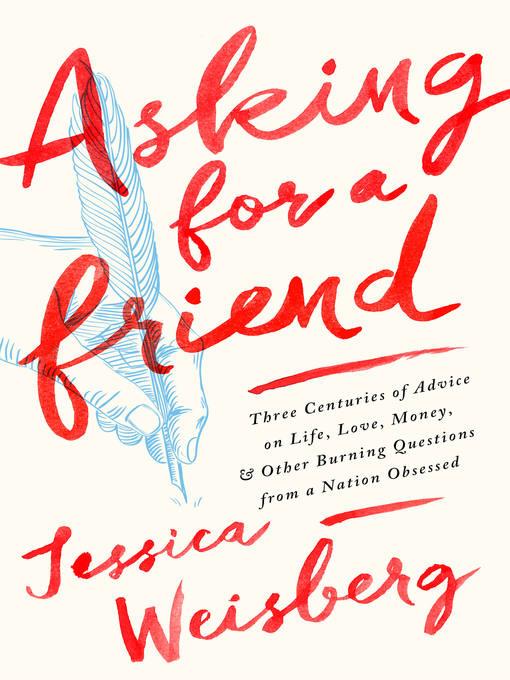
Asking for a Friend
Three Centuries of Advice on Life, Love, Money, and Other Burning Questions from a Nation Obsessed
- اطلاعات
- نقد و بررسی
- دیدگاه کاربران
نقد و بررسی

January 22, 2018
Self-help books may seem especially ubiquitous today, but as journalist Weisberg writes in her winning debut, the “American self-help empire has been sprawling aggressively for decades.” She recounts the evolution of professional advice giving via 16 different practitioners spanning over three centuries, from late-17th-century London publisher
John Dunton through 21st-century “life coach” Martha Beck. While cautioning that some of the advice discussed is “extreme, outdated, or downright insane” (such as 19th-century diet guru William Alcott’s strict no-tomatoes rule), Weisberg stresses that
her subjects were essentially well-intentioned, and not charlatans or hypocrites. Intriguingly, the book highlights trends over time, including the emergence of secular advice givers from the late 17th
to mid-19th century, the domination of the 20th by either self-styled “confidants” or credentialed experts, and the current trend of striking a balance between approachability and professionalism. Weisberg describes the distinctive traits of her book’s subjects, such as Ben Franklin’s use of pseudonyms, columnist Dorothy Dix’s combination of sympathy with tough love, and astrologer Joan Quigley’s direct line to the Reagan White House. Both those devoted to and bemused by self-help literature will profit from this insightful look into an ever-relevant and changing facet of American society.

March 1, 2018
A social history of and commentary on the extremely lucrative enterprise of dispensing advice.Realizing she cannot possibly deal with all, or even many, of three centuries' worth of professional advice-givers, Weisberg, formerly a producer of Serial as well as Vice News Tonight, narrows it down to a comfortable number and arranges her discussion chronologically. She begins and ends with commentary on Americans' fondness for obtaining advice from newspapers, books, conferences, and the internet and then takes us back to the late 17th century and John Dunton, whose Athenian Gazette debuted in London in March 1691. As the author writes, this periodical, which "delivered harsh and clear determinations of what was acceptable and what was not," was the beginning of it all. She then proceeds forward in fairly formulaic fashion: an introduction to each adviser, a bit of biography of the person, explorations of current practitioners who follow a similar approach, and comments about the strengths and failures of the techniques. Quite a few of the names will be familiar to general readers, including Benjamin Franklin, Dr. Benjamin Spock, Dale Carnegie, and Dear Abby. But Weisberg also focuses on less-well-known figures, including William Alcott and Joan Quigley, "Nancy Reagan's astrologer." The author is not afraid to deliver some zingers. She sees hypocrisy in Dr. Spock; marriage counselors Harville Hendrix and Helen Hunt are "old-fashioned"; Miss Manners (Judith Martin) is "a blend of a Jane Austen heroine and Anna Wintour." The most engaging chapters are those in which Weisberg participates in some fashion. She attends a Dale Carnegie workshop, interviews advisers, and brings personal perspective. She also provides plenty of historical nuggets, reminding us that Dear Abby and Ann Landers were estranged identical twins and that Elisabeth Kbler-Ross helped found the hospice movement. The tone is generally informative, though sometimes critical and even cynical.A swift account of an industry that bubbles with bluster and marinates in money.
COPYRIGHT(2018) Kirkus Reviews, ALL RIGHTS RESERVED.

April 1, 2018
In this absorbing book, Weisberg, an award-winning writer and producer for Gimlet Media, proves that advice takes many forms and that readers respond to it in myriad ways. For example, they might faithfully listen to a favorite advice columnist or regularly consult a horoscope. Whether we seek guidance, believe that we could fashion a better response to a question posed, or are grateful we are not experiencing the dilemma described, Weisberg suggests that, for most of us, such a forum is irresistible as it reflects America's "cultural tendency towards optimism" and the belief that all anyone needs is occasional help. This book focuses on actual advice givers, including household names such as Ann Landers, Dear Abby, and Benjamin Franklin, and others in the field, including Swiss American psychiatrist Elizabeth Kübler-Ross and Joan Quigley, Nancy Reagan's astrologer. Weisberg begins by tracing the roots of advice to the dubious Athenian Society in 1690s London, and then considers how subsequent advice givers have reflected and often shaped the history of America's culture wars. VERDICT Strong writing, thorough research, and a sharp focus on various aspects of culture and history makes this ideal for all types of collections.--Penelope J.M. Klein, Fayetteville, NY
Copyright 2018 Library Journal, LLC Used with permission.

March 1, 2018
Why is it we bristle at advice from close relatives yet eagerly seek guidance from anonymous strangers (with sometimes dubious credentials)? This engaging, documented, and thoughtfully presented overview of advice givers begins in 1691, with British seers who dispersed counsel on various topics, and culminates with Quora, a user-sustained website where anyone can weigh in on queries. Along the way, readers meet a succession of self-proclaimed gurus, many addressing the complexities of love and relationships and others wading into morality, finance, self-improvement, parenting, astrological destiny, acceptance of death, life coaching, or nutrition (such as the Inuit diet of raw fish and caribou promoted in the 1920s). Some names should be familiar (Dear Abby, Miss Manners), while others may have faded from public memory (Dorothea Dix, Joan Quigley). Author Weisberg provides historical context that frames trending angsts within bygone eras, explaining the consuming popularity of these pundits. This journey through collective incertitude doesn't seek to answer any of life's pressing questions, but it sure offers an enjoyable ride.(Reprinted with permission of Booklist, copyright 2018, American Library Association.)




دیدگاه کاربران